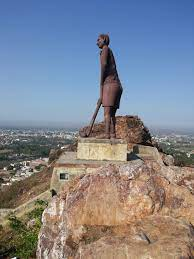Major Dhyan Chand
India celebrates its National Sports Day as a tribute to the greatest hockey player the world has ever seen; the birth anniversary of Major Dhyan Chand on August 29.
At the Mexico Olympics, when Bob Beaman jumped beyond 29 feet; the world record at that time being a few inches above 26 feet, the field judges went on to change the measuring tape to ensure that they were using the right measurement. Beamon’s ‘Leap to Infinity’ was attributed later to the low gravitational pull at the altitude at which the jump was taken. Legend has it that something similar happened with Dhyan Chand after a match in the Netherlands where his hockey stick was changed as people thought that he had some sort of a magnet in his stick that made the ball stick to it. In fact, it was a great tribute to his dribbling talent.
To summarize Dhyan Chand’s achievements, he played a major role in India winning gold medals in three successive Olympic Games; in 1928 (Amsterdam), 1932 (Los Angeles) and 1936 (Berlin) and scored 570 goals in his career which span from 1926 to 1949, during which he played 185 matches. The number of goals would exceed a thousand if his domestic matches were included in his total score. He indeed deserved titles like 'The Wizard’ and ‘The Magician’. It is a result of his exceptional career that India’s highest sports award in any sportsperson’s lifetime achievements is named after this great sportsman as ‘Major Dhyan Chand Khel Ratna Award’.
Dhyan Singh was born on 29 August 1905 in Allahabad, which at that time was a part of the United Province of Agra and Oudh, and is named now as Prayagraj in the state of Uttar Pradesh. Dhyan’s father, Sameshwar Singh, was a part of the British Indian Army and his frequent transfers affected the study of his three sons; Mool, Dhyan and Roop, till the family settled finally in Jhansi, another district in the state of Uttar Pradesh.
Dhyan Chand hardly played any hockey till he was recruited as a sepoy in the 1st Brahman Regiment of the British Indian Army, in 1922, as a seventeen-year-old teenager. The Regiment was reorganised later as the 1st Punjab Regiment. Once Dhyan Chand joined the army, he started participating in various Regimental and Army games and hockey was one of them. Young Dhyan Singh was seen practising hockey even under the moonlight, which earned him the nickname of ‘Chand’ (the Moon), a name that stuck with him till the very end.
When an Army team was sent to New Zealand, Dhyan Chand was a member of that team. The team performed exceptionally well and Dhyan Chand started getting recognition as an attacking forward. In 1925, the Indian Hockey Federation started selections for forming an Indian hockey team for the 1928 Amsterdam Olympics; five Province teams were formed for the players to demonstrate their hockey skills. The teams played again in 1927 before the Indian team for the Olympics was finalised. Incidentally, before leaving for the Olympics, the team played against a Bombay team and lost. Obviously, not much was expected from the team who lost to their home team.
However, what happened thereafter was totally unexpected. The Indian team played a few matches in England, winning all of them and also all its pre-Olympic matches. In its pool matches in the Olympics, the Indian team beat Austria, Belgium, Denmark and Switzerland convincingly and despite some of its players indisposed and even an unfit Dhyan Chand taking field, the Indian team won the final match against the home team with Dhyan Chand scoring two out of three goals. The Indian team not only won the gold medal, but what was even more remarkable was that none of the teams could score even a single goal against India. Dhyan Chand scored 14 out of 29 goals scored by the Indian team in five matches.
The Indian Army did not relieve Dhyan Chand for the 1932 Olympic trials but the IHF selected him without any trial. This time, his younger brother Roop Singh was also in the Indian team and once again the Indian team routed all teams to win the gold medal. In the finals, India defeated the host team with a record margin of 24-1. Of the 35 goals scored by the Indian team during the Games, the two brothers had a combined tally of 25 goals.
In 1936, the Army refused to relieve Dhyan Chand once again for the trials and once again the IHF included him in the final team and as the proposed captain refused to participate, this time Dhyan Chand was called upon to lead the Indian team. In a pre-Olympic match, India suffered a defeat against Germany but when it mattered, India defeated Germany 8-1. It is said that Adolf Hitler was so impressed with Dhyan Chand’s play that he offered the player a citizenship of Germany and the rank of Colonel in the Army which Dhyan Chand refused politely.
Dhyan Chand’s scoring blitz can be measured from the fact that the second-highest international goal scorer is Sohail Abbas of Pakistan with 348 goals; way behind Dhyan Chand’s tally of 570. For his achievements, Dhyan Chand was given an Emergency Commission in 1943. In 1956, the Indian Government honoured him with the Padma Bhushan and after his death in 1979, in 1980, the Indian Post and Telegraph Department issued a 35 paisa commemorative postage stamp in honour of him.
In 2002, the National Stadium in New Delhi was also renamed as the Major Dhyan Chand National Stadium.
What Donald Bradman is to cricket or Muhammad Ali to boxing, Dhyan Chand is to hockey. Among all the sports’ personalities of India, Dhyan Chand stands tall, head and shoulder above the rest just as his statue on Sipri Hill in Jhansi.






